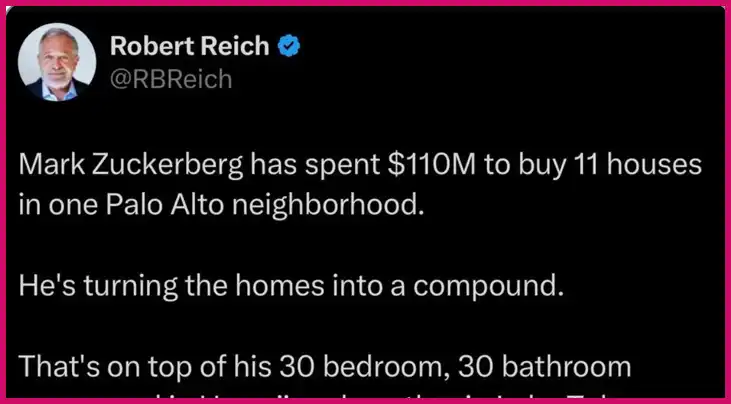A recent social media post has drawn fresh attention to the enormous spending power of the world’s wealthiest individuals, highlighting Mark Zuckerberg’s acquisition of 11 houses in a single Palo Alto neighborhood for a total of $110 million. The purchase, intended to create a large private compound, adds to his already extensive real estate holdings, which include major compounds in Hawaii and Lake Tahoe.
Table of Contents
This expenditure has reignited a public conversation about the scale of modern fortunes and the financial realities of the ultra-rich.
Contextualizing the Cost: The Scale of Billionaire Spending
While $110 million is a staggering sum for a personal residence, it serves as just one example of billionaire-level purchasing power. To put it in perspective, this amount is less than a quarter of the estimated $500 million Jeff Bezos spent on his single superyacht. Such figures illustrate that even within the billionaire class, there are vastly different scales of spending. For many, the sheer difference between a hundred million and a billion is difficult to grasp.
To visualize the gap:
- A million seconds is approximately 11.5 days.
- A billion seconds is over 31 years.
Zuckerberg’s $110 million purchase represents just over one-tenth of a single billion dollars, a fraction of a personal net worth that is valued in the hundreds of billions.
Challenging the Notion of “Tied-Up” Wealth
Discussions about billionaire spending often encounter the argument that most of their wealth is not liquid cash but is “tied up” in stocks and other investments. However, this narrative is challenged by their demonstrated ability to produce immense sums of cash on short notice.
When Elon Musk moved to acquire Twitter (now X), he was able to swiftly arrange over $20 billion of his own money. This is possible because vast asset portfolios can be leveraged as collateral for massive, low-interest loans. This allows the ultra-wealthy to generate billions in liquid cash without selling their primary assets, which would trigger tax events. Their fortunes provide a level of purchasing power and liquidity that operates on a scale fundamentally different from the rest of the economy, fueling the ongoing debate about wealth and taxation.
More Topics
- Phil Knight’s $2 Billion Donation – Philanthropy vs. Taxation
- The Death of Gary Webb: A Tragic Suicide or a Silenced Journalist
- Rachel Scott Recognized for Challenging Vladimir Putin at Summit
- What Happened to Spanish Actress Ana Obregón’s Son – Welcomes Granddaughter via Surrogacy
- Trump-Putin Summit Centers on Ukraine War
- Russian President Praises ‘Constructive’ Alaska Summit with Trump, Hopes for Path to Peace in Ukraine
- National Lottery Set for Life Results for Thursday, August 14, 2025

